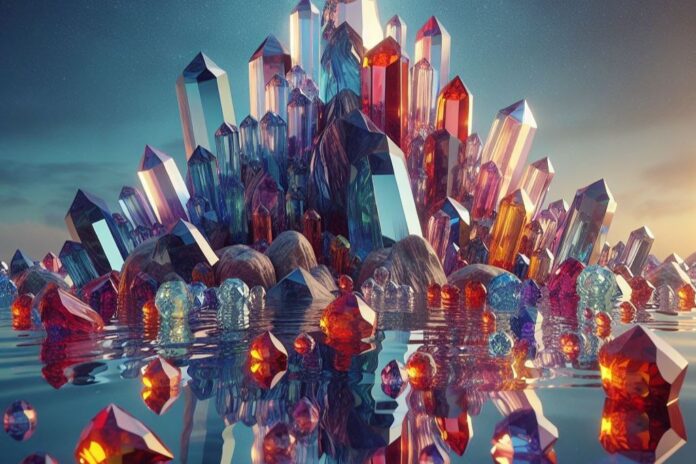Gemstones are prized for their beauty and metaphysical properties, but when it comes to placing them in water, there are often questions about their safety and effectiveness. In this comprehensive guide, we explore whether various gemstones, including crystals, can be safely submerged in water.
Below, you’ll find a table detailing whether popular gemstones can or cannot go in water:
| Gemstone / Crystal | Can it go in water? |
| Amethyst | Yes |
| Aquamarine | Yes |
| Carnelian | Yes, occasionally |
| Citrine | Yes |
| Fluorite | No, may fade or crack |
| Emerald | No |
| Labradorite | No, may pit or dull |
| Malachite | No, toxic when wet |
| Moonstone | Maybe, best to avoid for extended periods |
| Opal | No, can crack or lose luster |
| Pyrite | No, will rust |
| Rose Quartz | Yes |
| Ruby | No |
| Sapphire | No |
| Selenite | No, will dissolve |
| Topaz | Yes, it can! But only for a short while |
| Tourmaline | may be able to handle occasional contact with water |
| Turquoise | Maybe, it can change color or become dull |
| Rose Quartz | Yes |
Important Note: This table provides a quick reference for whether specific gemstones can be submerged in water. Keep in mind that while some gemstones may be safe for brief periods in water, prolonged exposure or certain cleaning methods may damage them. Always consult with a knowledgeable gemologist or follow manufacturer recommendations before exposing your gemstones to water.
Here are some additional things to keep in mind:
Hardness: Crystals with a Mohs hardness rating of 7 or higher are generally considered water safe.
Porosity: Soft and porous crystals may absorb water and become damaged.
Treatments: Some crystals may be treated with dyes or coatings that can be affected by water.
Safe Alternatives for Cleansing Crystals:
- Smudging with sage or another cleansing herb
- Placing your crystals in the moonlight
- Using sound vibrations from a tuning fork or singing bowl
So there you have it! Now you can make informed decisions about keeping your crystals sparkling clean.
Also See: Marble Murti Market in Jaipur
FAQs: Gemstones, Crystals, and Water
Can I clean my gemstones with water?
While some gemstones can tolerate brief exposure to water for cleaning, it’s essential to research each gemstone’s specific properties. Certain gemstones, like diamonds and sapphires, are generally safe to clean with water and mild soap. However, porous gemstones like turquoise and opal may absorb water and become damaged. Always consult a professional or refer to manufacturer guidelines before cleaning gemstones with water.
Will soaking gemstones in water enhance their properties?
There is a belief in some spiritual and alternative medicine practices that soaking gemstones in water can enhance their metaphysical properties. However, scientific evidence supporting this claim is lacking. While some individuals may benefit from practices like crystal healing, it’s essential to approach such methods skeptically and seek guidance from qualified practitioners.
Can I wear gemstone jewelry while swimming or showering?
It’s generally not recommended to wear gemstone jewelry while swimming or showering. Chlorine and other chemicals in swimming pools, as well as the prolonged exposure to water, can damage many gemstones and metals. Additionally, soap, shampoo, and other shower products may dull the appearance of gemstones and cause residue buildup. To preserve the beauty and integrity of your gemstone jewelry, it’s best to remove it before swimming or showering.
How can I safely clean my gemstone jewelry?
To safely clean gemstone jewelry, use a soft, lint-free cloth to gently wipe away dirt and debris. For more stubborn grime, dampen the cloth with lukewarm water and mild soap, then gently pat dry with a clean cloth. Avoid harsh chemicals, ultrasonic or steam cleaners, as they may damage certain gemstones. If in doubt, consult a professional jeweler for guidance on cleaning specific gemstones.
What should I do if my gemstone gets wet accidentally?
If your gemstone gets wet accidentally, gently pat it dry with a soft cloth as soon as possible to prevent water damage. Avoid rubbing or applying excessive pressure, especially to delicate gemstones. Allow the gemstone to air dry completely before storing it or wearing it again. If you’re concerned about potential damage, consult a jeweler for advice on how to properly care for your gemstone.










